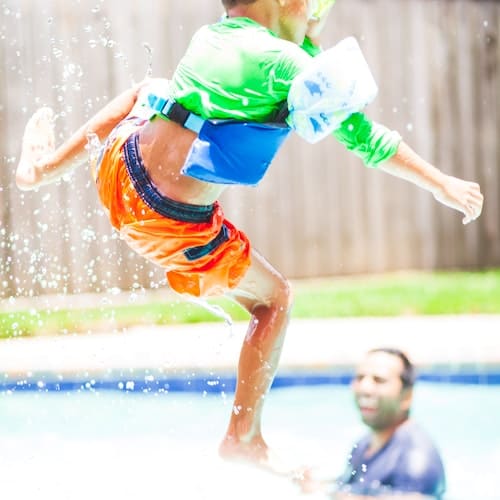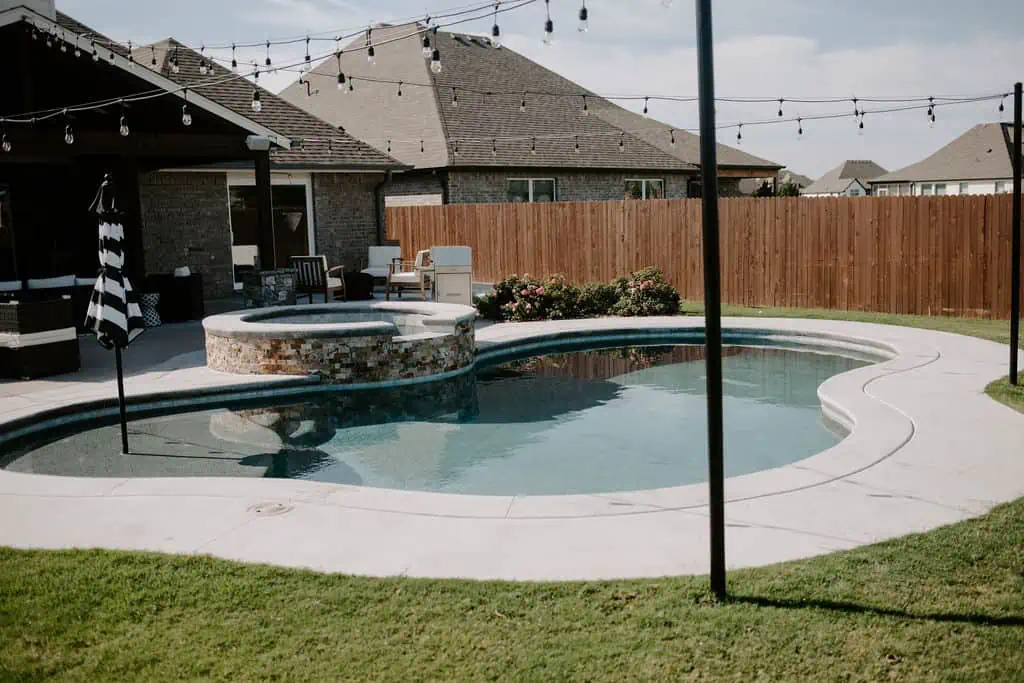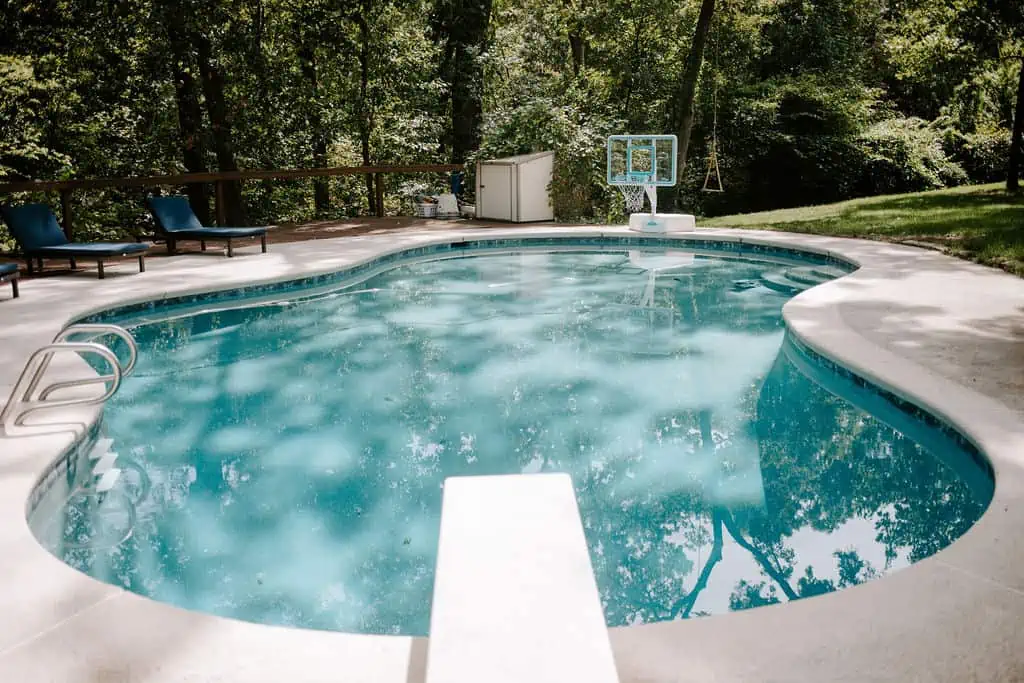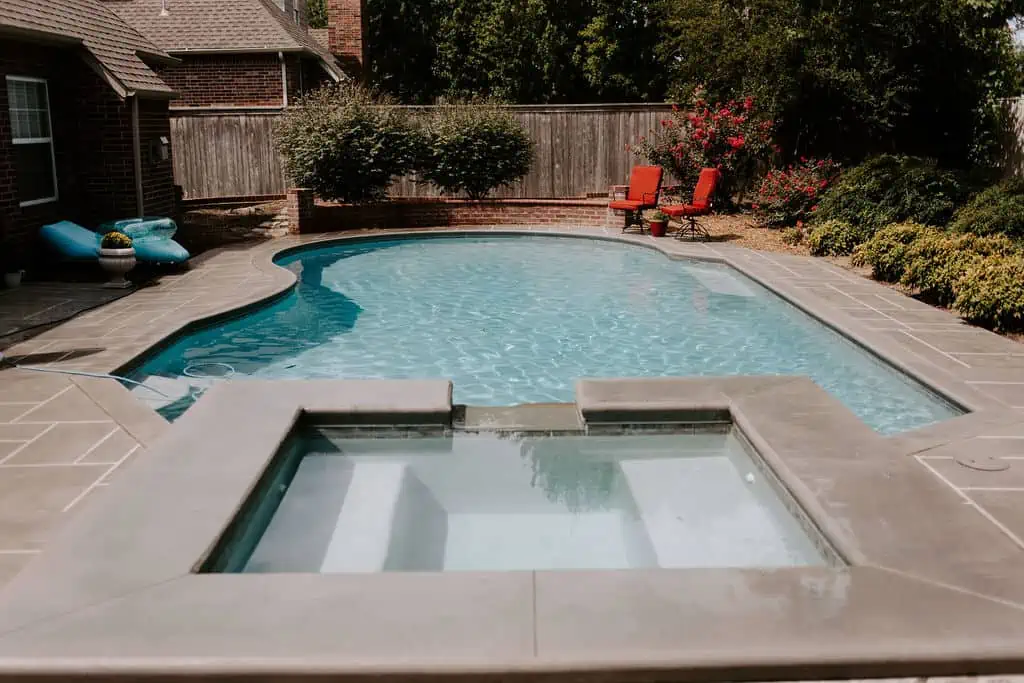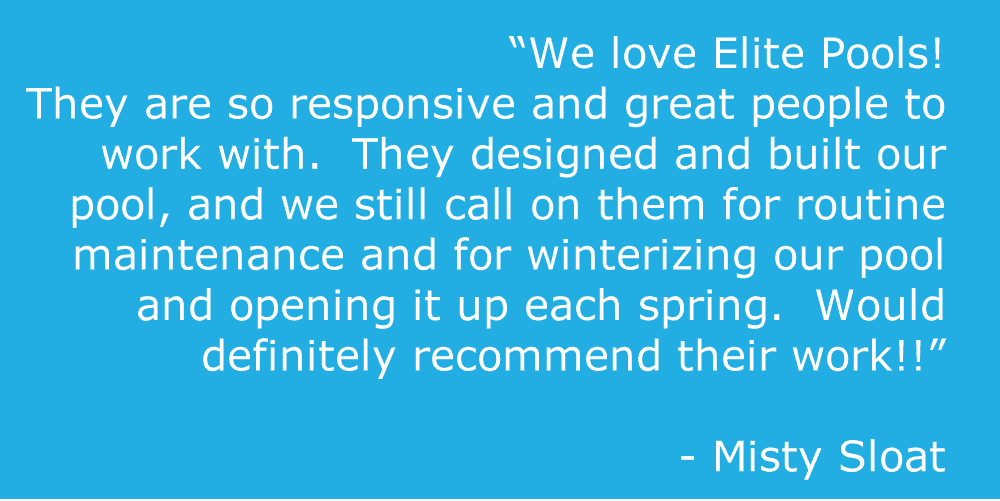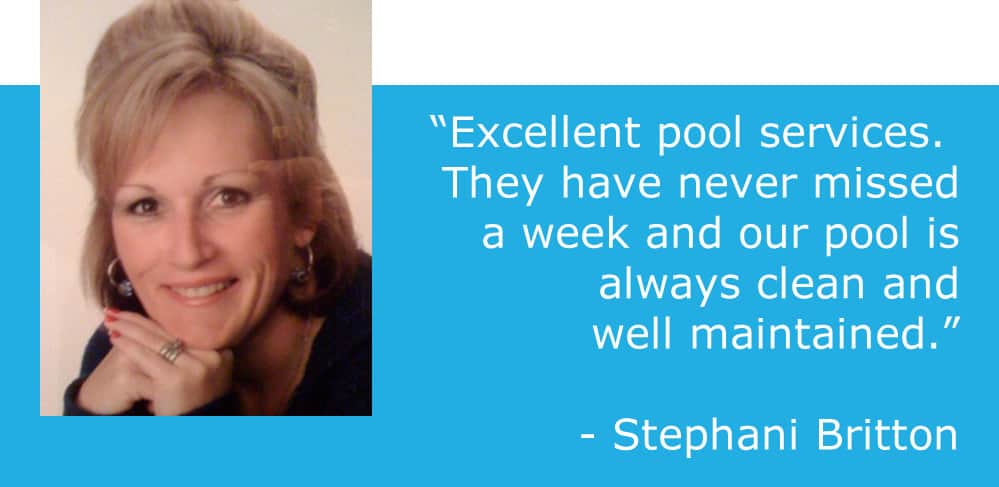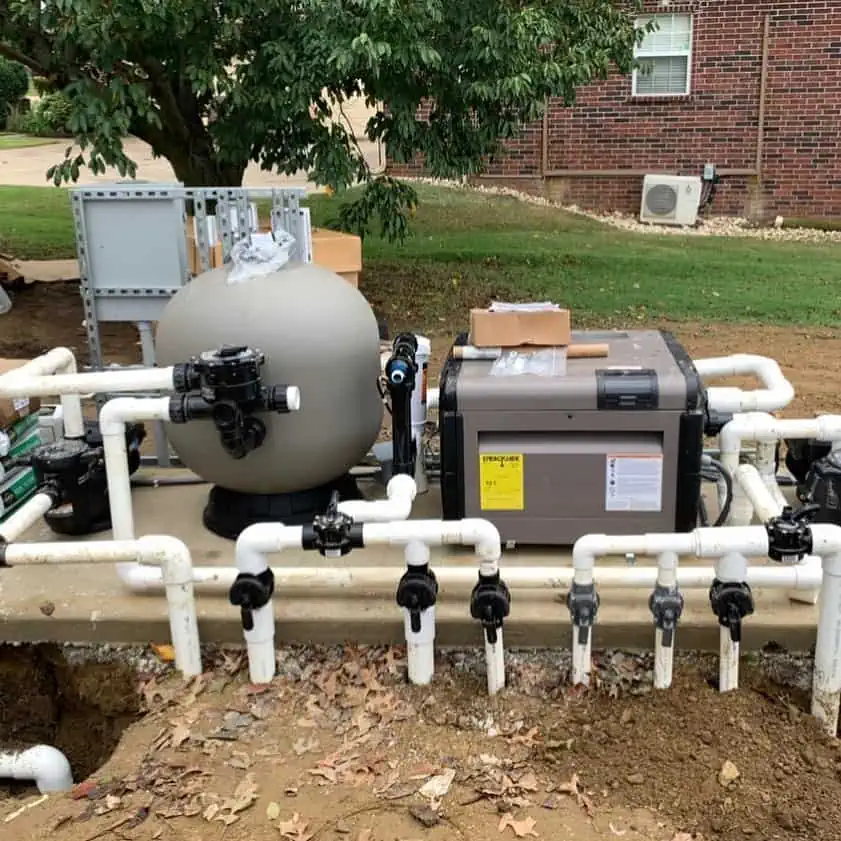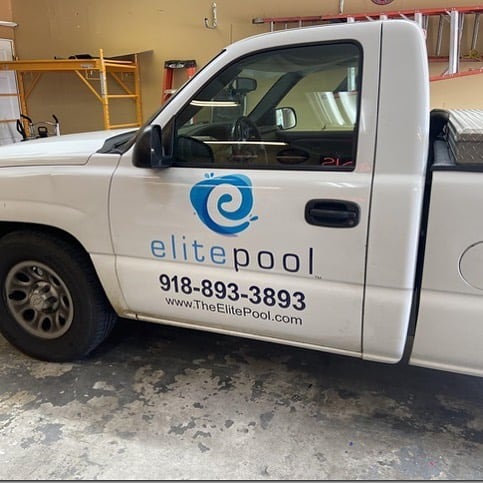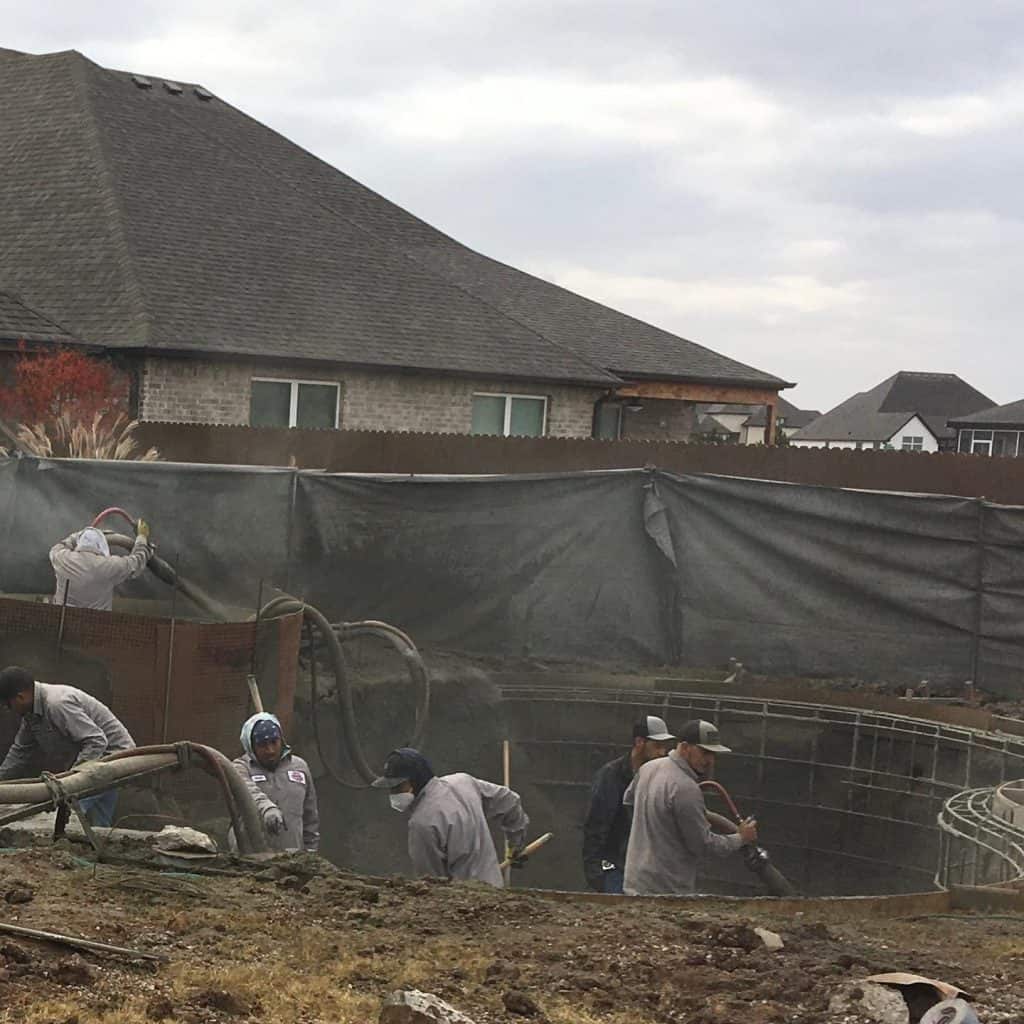Salt Water Pool Maintenance Services - NE Oklahoma

Many people have the impression that the water in a saltwater pool will be similar to ocean water, but that isn’t quite how it works. A saltwater pool actually has about 10 times less salt in the water than the ocean, and this amount needs to be maintained for the pool to remain clean and clear.
Saltwater pools are a popular alternative to chlorine pool sanitation systems by producing their own chlorine automatically. A saltwater pool system automatically converts salt into chlorine, using fewer chlorine levels to maintain a healthy pool. Many people love saltwater pools because they offer a less harsh alternative to chlorine and need less maintenance.
How Do Saltwater Pool Systems Work?
Saltwater travels through the pool’s circulation system, entering the salt chlorine generator. As the salt water flows through a salt cell, a low-voltage direct current is applied to the plates inside the cell to initiate electrolysis. Electrolysis breaks up salt and water into hydrogen gas and hypochlorous acid. The hydrogen gas evaporates in the form of bubbles, while the hypochlorous acid sanitizes the pool. After this process, the hypochlorous acid turns back into salt and repeats the process.
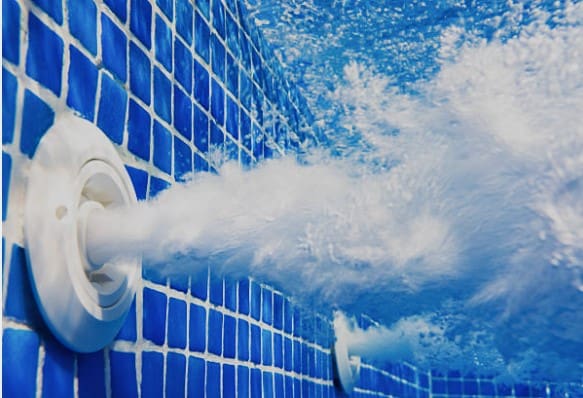
Unlike chlorine which is commonly added to swimming pools in liquid, tablet, or granular form, you don’t typically get the harsh chemical effects. Another key difference is that as chlorine is derived from salt, it’s a lot cheaper in the long run.
Happy Swimming Pool Owners - Reviews from Our Customers
"These folks are great to work with. Courteous, considerate, and very quick to respond to your needs. Very polite and respectful of your property. They put in a beautiful pool for our daughter's family and we stopped by frequently to see the progress. Based on my observation and seeing the final project, I would highly recommend this company for any pool needs you might have including designing, installation, and maintenance. Really good people with great ethics."
- Catrena Alford
5-Star Google Review
![]()
"Mark and Jenny do a great job of relaying what needs to be done to keep your pool in shape and following up and making sure it's being done right. They handle all sizes of jobs with professional and friendly service."
- Courtney Lewis
5-Star Google Review
![]()
Benefits of a Saltwater Pool System
- Saltwater pools are gentler on your body and clothing
- There is no harsh chlorine smell
- The water is softer
- You don’t need to store chlorine
- Lower Chlorine Levels
- They cost less to maintain
- Salt chlorination is a natural sanitization method, in contrast to using harsh chemical chlorine.
- Saltwater pools reduce skin and eye irritation
- Sparkling clear pool water every day
Salt Water vs. Chlorine Pools
Saltwater
Contrary to what some might think, saltwater systems are not chlorine-free. When you opt for a saltwater or saline pool, your pool’s filtering system comes with a chlorine generator. You add pool-grade salt to the water and the generator converts the salt into chlorine, which is then sent back out to the pool to sanitize the water. In the end, even with a saltwater pool you are swimming in chlorinated water but it’s a lot less chlorine than you would have with a traditional chlorine system. The water will have a softer quality than water in chlorine pools.
Chlorine Pools
Chlorine systems rely on larger amounts of chlorine to sanitize your pool water. Unlike saltwater systems, which convert salt into chlorine, chlorine systems require that you manually add store-bought chlorine to the water. Chlorine systems must be tested once or twice a week to maintain the proper chemical balance in your water. These tests measure pH levels, alkalinity and levels of sanitizers like chlorine and bromine. You will need to regularly add chlorine and other chemicals depending on the chemical balance.
Types of Salt to Use in a Saltwater Pool
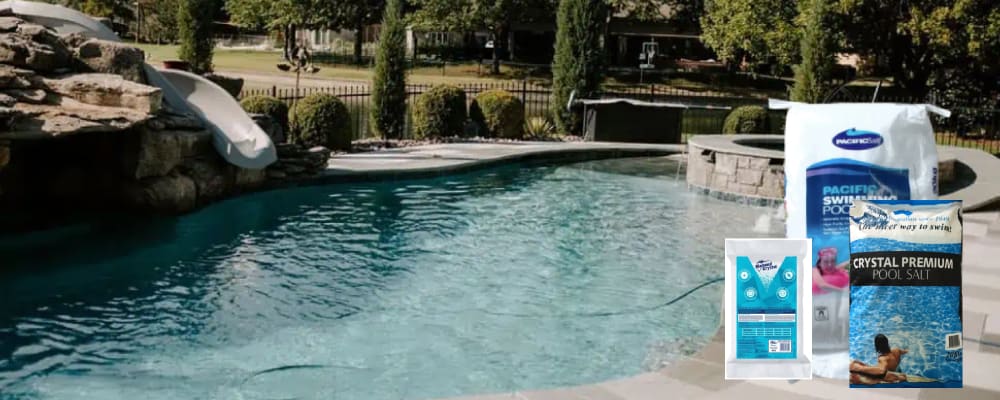
Saltwater pool salt is a coarse-ground salt. When buying pool salt, opt for 99% pure sodium chloride to prevent damaging your pool equipment or staining the pool. Make sure your pool-grade salt grind is compatible with your chlorine generator, otherwise, it won’t work properly. The amount of salt you add to your pool depends on your pool size.
For best results, use one of three types of salt:
- Solar
- Mined
- Mechanically evaporated
Signs Your Salt water Pools Needs Maintenance
- Discolored water
- Visible debris and residue
- A scaly layer on the water’s surface
- A lower water level
- Abnormally cold water
- Blocked pipes or broken hardware
- Broken swimming pool lights

Basic Saltwater Pool Maintenance and Care
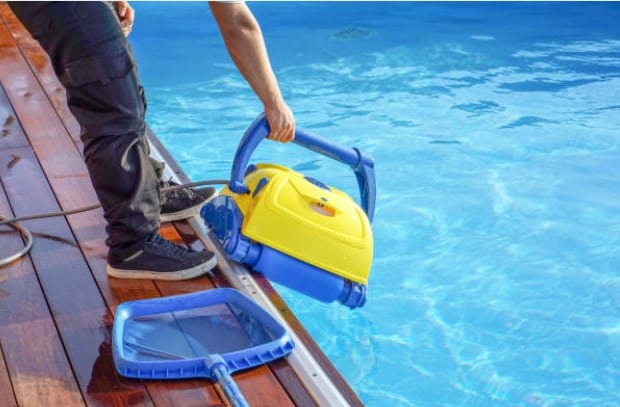
Daily
You should make it a habit to clean your pool and filters regularly, as this can help you save time and money. This will make your weekly and monthly tasks easier and quicker to deal with and keeps the pool working optimally.
Weekly
Every week, you should test your saltwater pool’s pH and free chlorine. There are test strips or test kits you can buy for this. There are test kits and strips you can buy to help you do this. A normal free chlorine level is between 1 and 3 ppm, and the pH should be between 7.2 and 7.4.


Monthly
There are 4 things you need to check every month: salinity, alkalinity, stabilizer, and calcium. Salinity levels should be between 2700 and 4500ppm, but this can vary between pool models. For alkalinity, you should be looking for a level that falls between 100 and 150 ppm. Stabiliser is what stops the chlorine from evaporating out of the pool.
7 Key Components of Saltwater Pool Maintenance
Adding the Right Amount of Salt
Maintaining the proper salt concentration is crucial for the saltwater generator to produce the necessary chlorine levels.
Usually, you only need to add salt to your pool water once or twice a year or right when opening your pool. That’s because the salt you add to the water won’t dissipate. The salt water generator uses the salt to produce chlorine and then it’s recycled back into the water.
Maintaining Proper Water Circulation
Effective water circulation is essential for distributing chlorine evenly throughout the pool and preventing stagnant areas where salt concentrations may rise.
Double-check your salt levels around your pool with a digital salinity tester. Be sure to test the water in multiple areas to make sure the numbers are consistent. If there’s a drastic difference between numbers, angle your return jets towards the pockets of salinity to help circulate dead zones.
Preventing Erosion and Calcium Buildup
Saltwater pools can cause erosion and calcium buildup on pool surfaces and equipment if not managed properly. Regularly rinse the pool surroundings to prevent high concentrations of salt outside the pool.
Calcium flakes are caused by the high pH byproduct and scale formation in your salt cell. This can happen when you first turn on your saltwater generator at the beginning of the season and it usually resolves after it runs for a bit. But salt water generators are prone to calcium buildup, so avoid using chlorine shocks with calcium, like cal-hypo shock, and be sure to regularly clean your salt cell.
Checking the Salt Cell Every 3 Months
The salt cell is a vital component of the saltwater pool system. Inspect the cell every three months to ensure it remains free from calcium buildup and other deposits.
Inspect the cell at least every 3 months and clean it by hand or with a hose to remove build-up. You can also use a diluted solution of muriatic acid to remove deposits. But be sure to follow any cleaning directions that came with your saltwater generator.
Balancing Water Chemistry: Ph and Chlorine
Regularly testing and balancing the water chemistry is crucial for a healthy saltwater pool.
While your saltwater generator should display the correct chlorine levels in your water, there are times when the system might not be working correctly. And as we mentioned before, saltwater systems produce naturally high pH levels. So testing and balancing your water regularly, especially your pH and chlorine, is crucial.
Weekly Pool Shocking
Shocking the pool on a weekly basis helps eliminate bacteria and contaminants.
Shocking your pool is the act of adding a super-concentrated dose of chlorine to your water. And helps kill algae and bacteria and refreshes your active, free chlorine.
Regular Skimming, Brushing, and Vacuuming
Keeping the pool clean from debris and maintaining proper hygiene is essential. Skim the water surface regularly to remove leaves and other floating debris.
Like any pool, you’ll want to make sure your water is free from debris and your pool surfaces are clean. So once a week, use a skimmer net, pool brush, and pool vacuum to clean your water.
How often should a salt water pool be serviced?
Saltwater pools should be serviced at least once a month. Regular maintenance is essential to ensure the pool remains clean and safe for swimming. Monthly service includes checking the chlorine levels, testing pH balance, cleaning filters, and inspecting all equipment for any signs of wear or damage. Additionally, salt cells need to be cleaned every three months to prevent the buildup of calcium deposits that can cause corrosion and reduce efficiency. By following these guidelines, you can keep your saltwater pool in top condition year-round.
Do saltwater pools require a lot of maintenance?
Because the salt cells in a saltwater system only produce chlorine as needed, the pools require less maintenance when compared to traditionally chlorinated swimming pools.
Saltwater pools generally require less maintenance than a traditional chlorine pool. While some of the basic cleaning duties are the same, such as skimming debris off the top of the water, applying a vacuum to the bottom, and cleaning the sides at the water line, the maintenance of the water is rather simple, simply add the required salt at the prescribed times.
Saltwater Pool Maintenance Cost
Saltwater pools are generally more expensive than traditional chlorine-based pools. The initial cost of installing a saltwater pool is usually higher, as the equipment needed to convert your existing pool into a saltwater system can be costly. However, the long-term costs associated with maintaining a saltwater pool may be lower than those for a chlorine-based pool. Saltwater systems require less maintenance and use fewer chemicals.

Saltwater pool maintenance tips to keep in mind
- Resist the urge to add more salt for "good measure".
- Add just enough, and test your free chlorine levels regularly to make sure you haven't gone overboard.
- Don't assume that if you can't smell the chlorine, it's not too high.
- Again, stay on top of your testing.
- Even a saltwater pool requires the occasional pool shock.
- Make sure you follow any instructions from your pool builder, salt cell manufacturer, and pool shock maker to properly treat the water in your saltwater pool.
- If you feel uncomfortable handling acid for your salt cell, hire a professional to do it for you.
- Regularly spray down your pool deck and the area above your waterline to keep salt corrosion at bay.
- Choose a salt with fewer impurities to get the most life out of your generator.
- Manually test the salt levels in your pool to make sure your system is on track.
- Create a saltwater pool care schedule so you don’t miss important tasks
- Since rainwater dilutes pool chemicals, always test after a rainstorm.
- Shock your pool after heavy use—like following a pool party.
- Your pump, filter, and skimmer come with maintenance directions to make things easy.
- If you’re short on time, use a pool chemical or pH test strip rather than a liquid testing kit.
Authorized Dealer for these Pool Products/Manufacturers





Trust the Elite Pool Service Experts for Your Saltwater Swimming Pool Care and Maintenance
It doesn't matter if you own a salt system swimming pool or a chlorinated one. You should always prioritize in-depth cleaning and maintenance work. If you want to own a swimming pool that's beautiful, clean and healthy, you should recruit experienced professional assistance.
Professionals have the expertise and skills necessary to keep your pool in peak condition no matter what. If you want your pool to be a healthy and pleasant environment for all, you should avoid taking matters into your own hands. All the pool services we are offering are above-board. At Elite Pool Services, we make it a point to present all our clients and prospective clients with a reasonable quote and a clear maintenance plan and schedule. With us, there will be no confusion as all our services come with crystal clear job descriptions.
Contact us at Elite Pool Service and entrust the pool cleaning and saltwater pool maintenance service-related tasks to us, and we will do our best to provide you with consistent results you won’t get anywhere else.
The Elite Pool Service is available to work with your pool in NE Oklahoma and its surrounding areas. Our skilled team of pool technicians understands the specific needs of saltwater pool maintenance and is ready to help you today.



